I'm fairly confident that I'm not going to finish my current book in the next four hours, because I'm going to play video games, lay out tomorrow's clothes, and go to sleep. With that in mind, I figured it was ok to go ahead and talk about all of the books I read this month, and if I randomly do plow through that last hundred pages I guess I get a head start on February.
Here are the first books I've read for the new year:
1) In Patrick Ness' The Rest of Us Just Live Here the indie kids, the ones with the cool names ("There are three of four named Finn, and there are two Satchels, a boy Satchel and a girl Satchel") who don't join the cheer squad or go to dances or any of the regular high school stuff are always out in the woods, fighting vampires and monsters and stopping the end of the world, occasionally blowing up the high school to exorcise the sorrow from Japanese soul ghosts or opening fissures to the realm of the immortals, being the Chosen One and following their cosmic destinies. This isn't a novel about the Indie Kids. It's about the kids who sit next to them in class, who have problems of their own and who really want to survive and graduate without being collateral damage and before the next time something blows up the high school.
This was an ok read, but I wouldn't read it again. The idea was entertaining, but in execution this just didn't come together and wasn't really that interesting.
2) Tabatha Coffey's memoir, It's Not Really About the Hair, talks about her life and her journey to finally becoming the host of "Tabatha's Salon Takeover". It kind of makes me a little sad that they didn't talk about her or show more of her own life on the show, because as entertaining as it was to watch her stories about growing up in her parents' drag clubs or travelling the world to demonstrate hair cutting and hair products are kind of more interesting than watching her yell at someone about their dirty floors.
I may be miscounting, but I think this is the fourth book by a Bravo network personality that I've read. I feel like I should be way more ashamed of that than I am.
3) I can't remember how Catharine Arnold's Necropolis ended up on my radar, but my best guess is that I saw it referenced in another book about archeology somewhere in the last two or three years, stuck it on my wish list, and then gradually forgot why I did so. An account of how London has dealt with its dead from the days of the Roman conquest all the way up through Princess Diana's funeral, there was some interesting stuff here, but this was also fairly dry, like a textbook, and difficult reading on the treadmill. I finally powered through on a seven mile day, but it was pretty slow going before then. Part of that might be that this is written more as an educational book, almost a textbook, than it seems to be written for the general public. People who really like London might enjoy it, though.
4) Gregory Maguire's After Alice, the book I was forcing myself through off the treadmill at the same time I was forcing myself through a book on the treadmill, wasn't nearly as magical as promised. A reinvention of "Alice's Adventures in Wonderland", it concerns the adventures of Ada, a neighbor girl who falls into Wonderland a few minutes after Alice, and all of the people around her and Alice. Above ground, Alice's sister, Lydia, and Ada's governess try to get along long enough to search for the missing girls while Alice and Lydia's father entertains a prestigious visitor: the elderly Charles Darwin. Meanwhile, Ada finds herself following Alice through Wonderland, trying to catch up with her, after Alice in the sense of chasing her and after Alice temporally, always a few minutes behind. Eventually there's a third lost child, but Ada manages to find herself. I normally like Gregory Maguire, but this was boring.
Reading two boring books at the same time was kind of excruciating.
5) I didn't make it to the theatre to see "Carol", so I put Patricia Highsmith's The Price of Salt on my wish list, and my parents bought it for me for Christmas. It chronicles the beginning of a troubled love affair between Therese, a stage set designer working a temporary job at a department store, and Carol, a suburban housewife whose marriage is collapsing. It was a little depressing, as being gay sometimes is, but managed not to end in tragedy, which is a nice change from most gay literature of that period.
Now that I've read the book, I'm intrigued by the way some of the commercials for the movie present this. I saw a few that called it a thriller, and noticed that none of them mention that there are lesbians in this. I'm wondering if this is a deliberate move to widen the potential audience (a lot of people would automatically decide not to see something about lesbians, and might think this is some other sort of period piece instead) or if the story is only loosely based on the book.
6) I know that, as an adult, I'm not supposed to read teenage lit, but Danielle Paige's Dorothy Must Die looked interesting, and it was! Mixing the Oz books with the currently popular "dystopian teenage nightmare world", Paige gives us Amy Gumm, a pink haired misfit from a trailer park in Kansas. When her trailer is picked up and blown away by a tornado, Amy finds herself in Oz, but a very dark, very different Oz. Dorothy, all grown up, is queen, and is mining all of the magic out of Oz to have for herself. The land is dark and the people live in fear under Dorothy's lieutenants: they might be eaten by the Lion while he consumes their fear, they may have their brains removed by the Scarecrow to enhance his own, or they may have their limbs replaced with tin and steel to become soldiers for the Tin Woodsman. Amy is recruited by three witches to join the resistance and to train for a mission that could save all of Oz: Amy must infiltrate the palace and kill Dorothy, but to do it, she'll have to get past the Scarecrow, the Lion, the Tin Woodsman, Glinda, and possibly her own idea of who she is. I enjoyed this so much that I picked up the sequel before the blizzard, just in case, and then we didn't even have a blizzard.
7) The sequel to "Dorothy Must Die", The Wicked Will Rise, picks up right where the last book left off. Amy Gumm and her allies have been scattered through Oz, lost and possibly killed. Amy, with Ozma in tow, sets out to find them and complete her mission: to kill Dorothy and restore magic to Oz. Faced with shifting alliances and betrayal, who can Amy trust? And is learning magic turning her into the thing she fears, and making her just as bad as Dorothy? The ending left me unclear on whether or not there will be a sequel, but this was a good read, if a little fast.
I guess the year is off to a pretty good start, but I should probably lay off the young adult books for a little while.
Sunday, January 31, 2016
Monday, January 18, 2016
Bread Pudding for One
The grocery store had some little pretzel dinner rolls on "manager's special" today, which is their way of saying, "Old bread, on clearance. Please buy it before it molds." I had no firm plans for lunch, so I thought, "Hey, why not make sandwiches on little pretzel rolls? Could be different. Might be good," and I bought the clearance pretzel rolls.
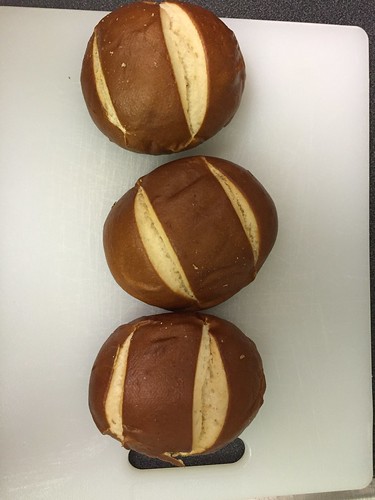
They weren't terrible, but they weren't wonderful. They were dense and a little chewy, and they didn't especially taste like pretzels. Instead they just tasted like salty bread, and I didn't really want to eat any more sandwiches on them. I didn't want to just throw them away, though, since that seemed wasteful, so I tried to think of what else I could turn them into. They were too thick for French toast, and I didn't have anything I could use as sauce to make mini pizzas on them. I could have gone to the store again, but it's cold outside, so I had to think of something to do with them using ingredients I already had.
"Bread pudding? Is it possible to make bread pudding for just one person?"
Google suggested that it was. That recipe seemed a little flexible and vague, so here's what I ended up using as the base ingredients:
3 slider-sized pretzel rolls, diced
4 tablespoons skim milk
2 tablespoons melted butter
2 tablespoons sugar
3 eggs
pinch of cinnamon
I had some baker's chocolate left from making fudge, so I roughly chopped two pieces:
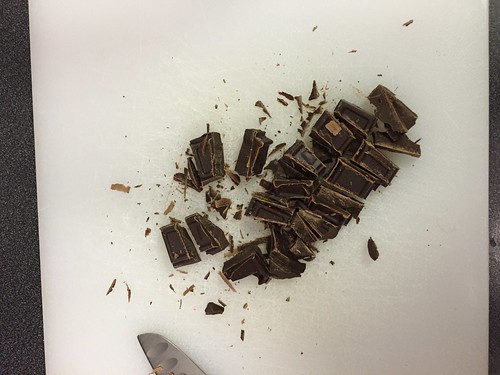
and I mixed in a handful of raisins:
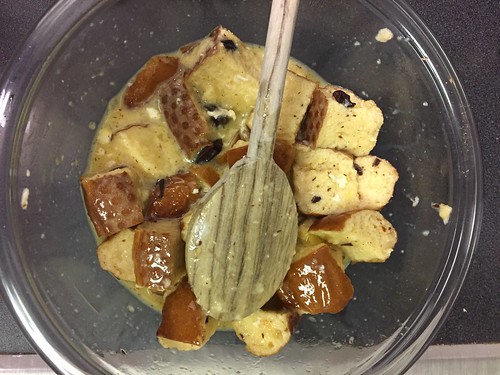
After I pushed on the bread with the spoon to try to get it to soak up as much of the liquid as possible (you may want to let it sit for a few minutes if you're using dense bread) I split it into two Pyrex 700s, which are tiny little 10 ounce casserole dishes:
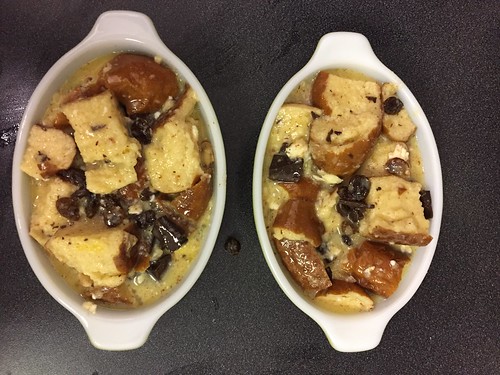
and then I put them in the microwave for two and a half minutes, then let them cool for five minutes.
When done, I had decent bread pudding:
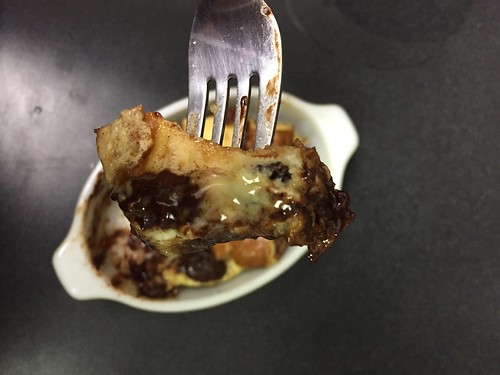
Is it the best bread pudding ever? Well, no. It's bread pudding I made in five minutes in the microwave.
If you have some bread to use up, though, or have a craving and don't want to spend 45 minutes baking in the oven, or want to make just enough for one or two people and not a whole pan, this worked out pretty well. I'm thinking of doing a savory breakfast version without the sugar and with bacon bits, a couple of slices of wheat bread, and some shredded cheese.

They weren't terrible, but they weren't wonderful. They were dense and a little chewy, and they didn't especially taste like pretzels. Instead they just tasted like salty bread, and I didn't really want to eat any more sandwiches on them. I didn't want to just throw them away, though, since that seemed wasteful, so I tried to think of what else I could turn them into. They were too thick for French toast, and I didn't have anything I could use as sauce to make mini pizzas on them. I could have gone to the store again, but it's cold outside, so I had to think of something to do with them using ingredients I already had.
"Bread pudding? Is it possible to make bread pudding for just one person?"
Google suggested that it was. That recipe seemed a little flexible and vague, so here's what I ended up using as the base ingredients:
3 slider-sized pretzel rolls, diced
4 tablespoons skim milk
2 tablespoons melted butter
2 tablespoons sugar
3 eggs
pinch of cinnamon
I had some baker's chocolate left from making fudge, so I roughly chopped two pieces:

and I mixed in a handful of raisins:

After I pushed on the bread with the spoon to try to get it to soak up as much of the liquid as possible (you may want to let it sit for a few minutes if you're using dense bread) I split it into two Pyrex 700s, which are tiny little 10 ounce casserole dishes:

and then I put them in the microwave for two and a half minutes, then let them cool for five minutes.
When done, I had decent bread pudding:

Is it the best bread pudding ever? Well, no. It's bread pudding I made in five minutes in the microwave.
If you have some bread to use up, though, or have a craving and don't want to spend 45 minutes baking in the oven, or want to make just enough for one or two people and not a whole pan, this worked out pretty well. I'm thinking of doing a savory breakfast version without the sugar and with bacon bits, a couple of slices of wheat bread, and some shredded cheese.
Sunday, January 10, 2016
All The Food I Cooked Over Break
Our university gives us a week of paid leave in December, and when I'm not traveling during that time I usually make a lot of grand plans that end up falling by the wayside as the luxury of being able to lay around the house and not interact with other people for days at a time becomes comforting, routine, and hard to snap out of. Seriously, not talking to another person for more than three days can be much more exciting than I ever imagined. When I was in high school we took those career aptitude test things a few times, and one of the times it told me I should look for "solitary professions", and actually offered "lighthouse keeper" as an example. At the time I was like, "That sounds so depressing", and now I'm like, "But the lighthouse has internet and gets Amazon Prime shipping, right?"
Anyway, my plans this time were somewhat more modest:
1) Meet daily step counts. Done!
2) Buy a new TV. Still not done! I went to the store, was overwhelmed by options, realized I needed to do more research, did the research, and then never went back for the TV.
3) Go new look at new cars. Still not done! Haven't even started!
4) Cook a bunch of recipes I had written down on my notepad. Done!
Over the weeks leading up to the break, I started thinking about Christmas dinner and Christmas dessert, and making notes of potential recipes. Then the week before break I won an electric fondue pot in our office non-Christmas December break season party Sneaky Snowman not Dirty Santa gift exchange, and decided that I wanted to use that, too, but that I didn't want to have fondue for Christmas dinner. With that in mind, I decided to start my week of break with...
Cheddar and Chorizo Fondue
I did not use a recipe for this, because I still had most of a giant brick of Velveeta left from the Velveeta Fudge Experiment. (FYI: Do not make the Velveeta fudge, no matter how many people tell you they always do. After a few days, it developed an oily sheen, and a day after that it began to discorporate into strange components.) Despite the common practice of microwaving Velveeta and Rotel as a dip, I was concerned about using it in the fondue since I remember from the macaroni and cheese that Nikki made out of it on Top Chef Chicago that once it stops being liquid it locks up into a hard solid, but I decided to add milk, a little corn starch, and some regular cheddar to it and hope for the best:
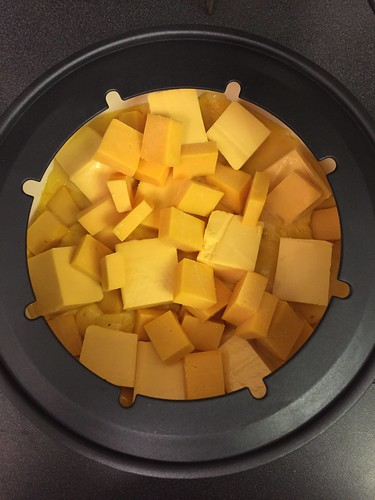
With the cheese slowly melting, I got to work on browning the chorizo:
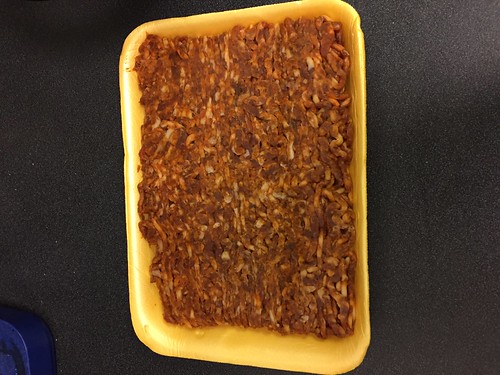
and cooking it down to small, browned nuggets:
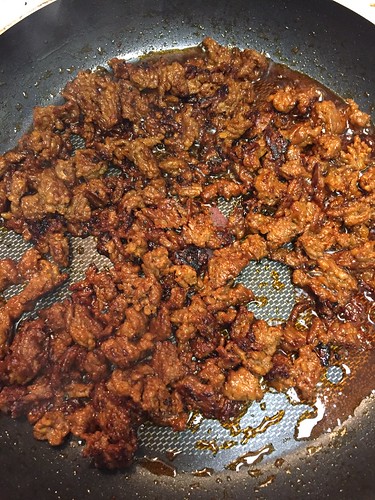
This wasn't the brand of chorizo that I usually use, but was on sale. Next time I will switch back to the other stuff, because it cooks down to a better texture. Regardless, I stirred in my finished chorizo, diced half a loaf of bread, drizzled the cubes with olive oil and fresh ground pepper, toasted them on low heat under the broiler for a few minutes, and enjoyed an evening of fondue in front of a movie.
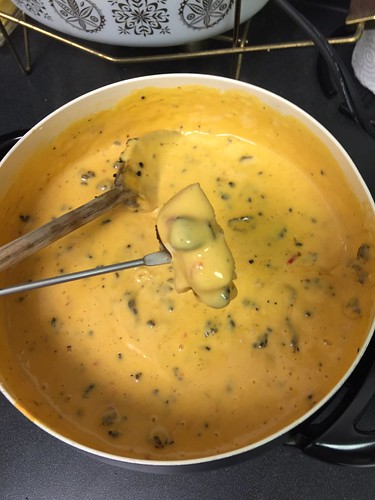
Later in the week, I used the leftover fondue as the sauce for cheddar and chorizo macaroni and cheese, and then used the rest of the loaf of Italian bread to make mini pizzas, to eat alongside...
Ina Garten's Pea and Fennel Soup
This was super easy, and I will definitely make it again. The cashier at the grocery store was confused as to what my bulb of fennel actually was, having never seen one before, but I was equally confused the first time I used fennel, and we spent most of the transaction with me explaining what it tastes like, how you prepare it ("Usually you chop it up and only use the white part for cooking and sometimes the fronts for garnish"
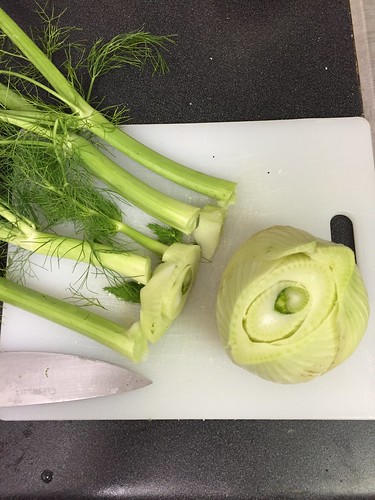
), and what I was going to do with this piece. The answer was that I was going to chop it up, cook it down with a diced onion:
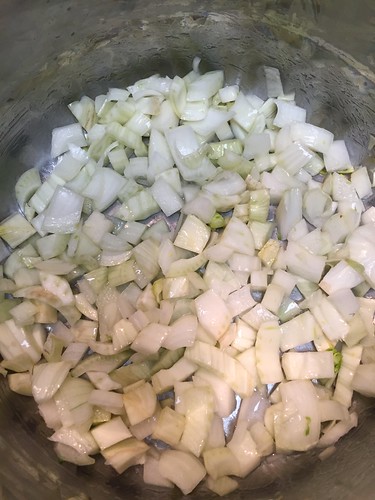
add peas and stock:
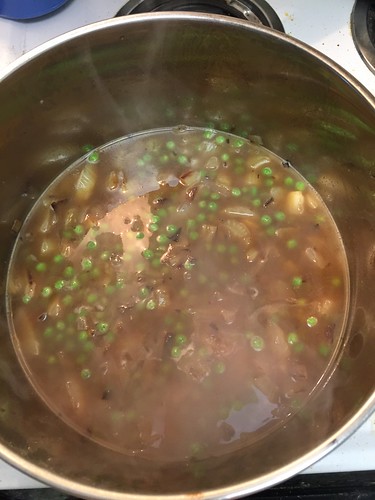
then puree the hell out of it, add crème fraiche, and serve it alongside mini pizzas with artichoke hearts and prosciutto:
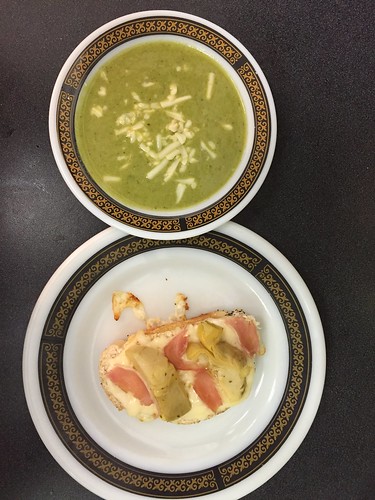
It was so good.
Coasting through the week on leftover soup and leftover chorizo mac and cheese, I got ready for Christmas dinner by making dessert the night before...
Jelled Holiday Nog
I've wanted to make the Jelled Holiday Nog since I saw it on the far left of this photo:

in The New Joys of Jell-O cookbook. My friends reacted with predictable horror when I explained that I was making Jelled Holiday Nog, but I explained that it may not be as frightening as it sounds, because it doesn't contain any actual dairy:
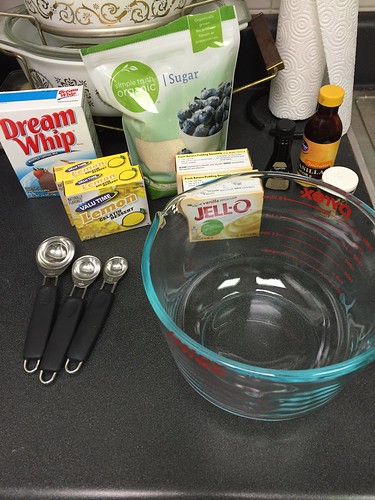
Nope, it's just a collection of powders:
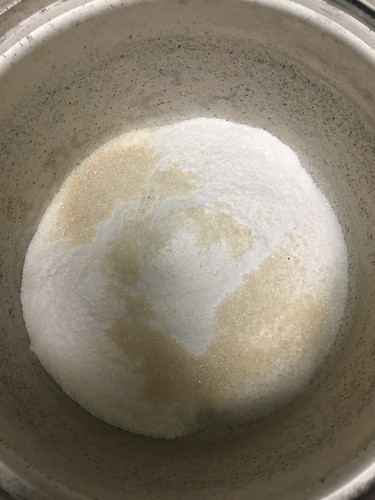
mixed and cooked with water:
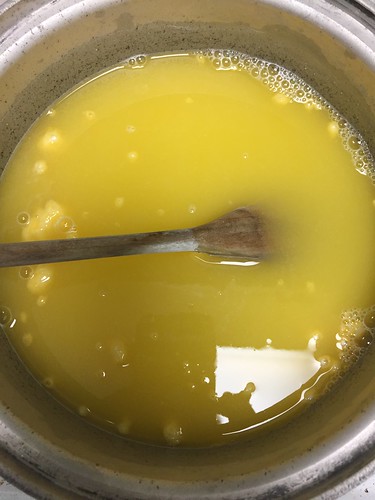
and prepared Dream Whip topping mix:
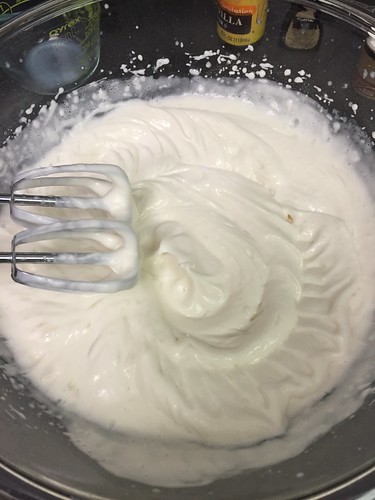
plus extracts and more powders and then combined:
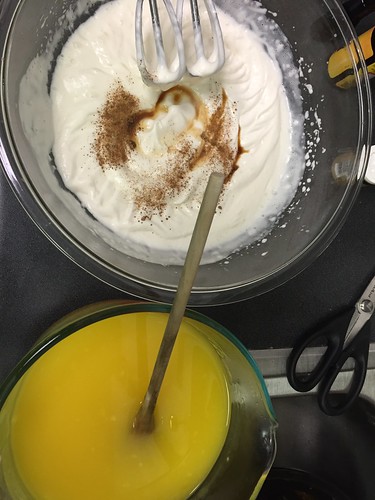
to make a big bowl of Jelled Holiday Nog:
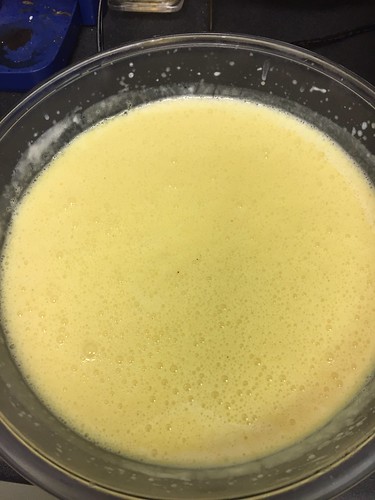
Once it set overnight in the refrigerator, gelling (or Jelling, if we want to stay on-brand), I scooped some out:
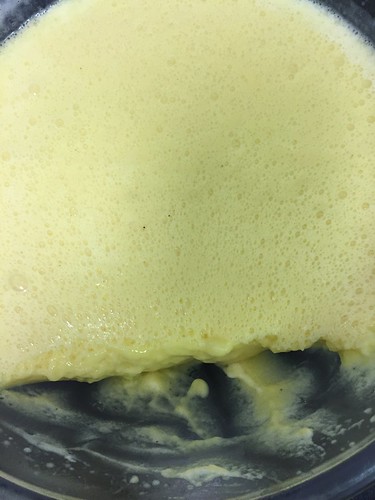
and had a taste:
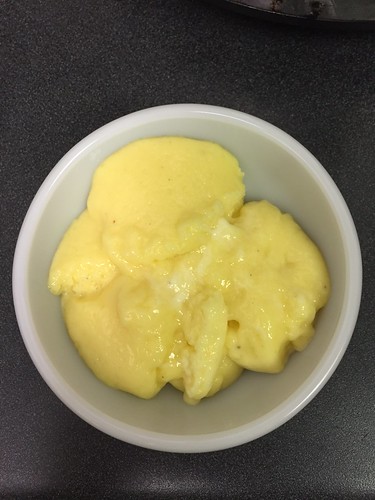
Everyone who likes eggnog should make Jelled Holiday Nog for every Christmas for the rest of their lives. It is a gallon sized bowl of pudding that tastes like eggnog, and it is delicious. Even better, you can make it any time of year when you have an eggnog craving. It also made a nice complement to my Christmas dinner...
Slow Cooker Sweet Fire Chicken
I saw this recipe in a Buzzfeed post (I follow Buzzfeed Food on Facebook) and was intrigued by how easy it sounded and how good the photo looked, even though I know online photos of food are not to be trusted unless I or someone I know who is not a food stylist took them. I was slightly concerned about using a sauce that called for corn starch to thicken it after I had a little bit of trouble that one time, but I figured I could just be more careful this time and everything would be fine.
And it was!
I diced up my chicken:
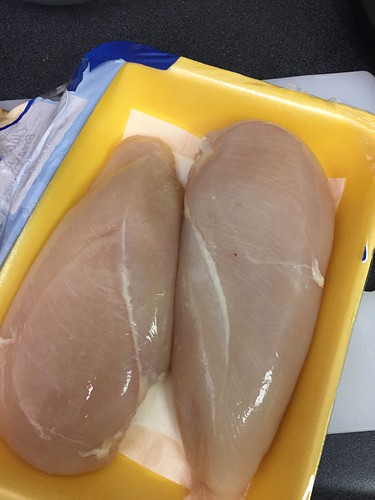
gutted and diced a red pepper:
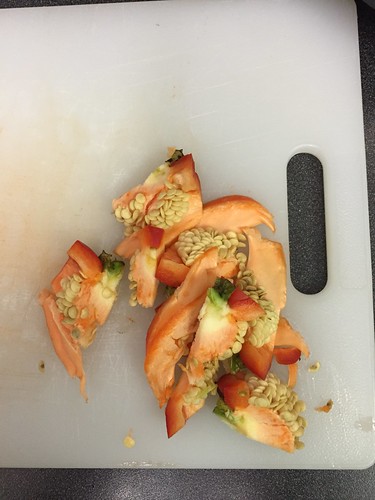
and added them to the slow cooker with a can of pineapple chunks:
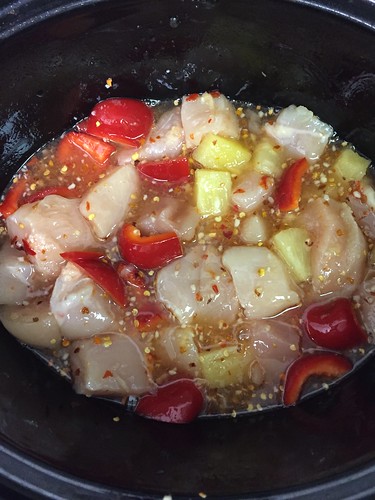
and a sauce that seemed to have quite a bit of pepper flakes in it:
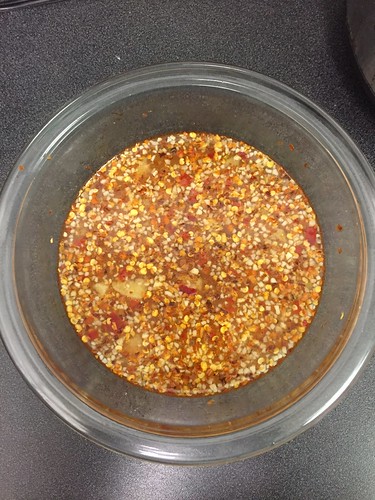
and ignored it for the day. Later I finished the sauce, made some rice, and served it up:
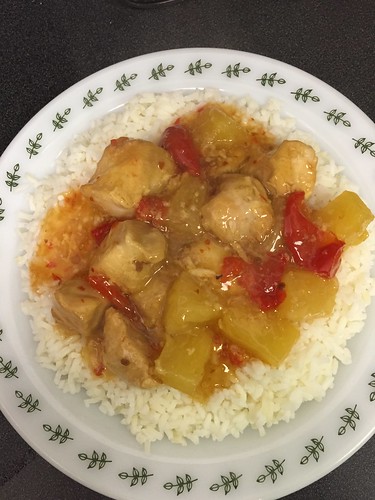
and it was delicious. As promised, though, it was very spicy, especially since I added extra chili pepper to mine.
Anyway, my plans this time were somewhat more modest:
1) Meet daily step counts. Done!
2) Buy a new TV. Still not done! I went to the store, was overwhelmed by options, realized I needed to do more research, did the research, and then never went back for the TV.
3) Go new look at new cars. Still not done! Haven't even started!
4) Cook a bunch of recipes I had written down on my notepad. Done!
Over the weeks leading up to the break, I started thinking about Christmas dinner and Christmas dessert, and making notes of potential recipes. Then the week before break I won an electric fondue pot in our office non-Christmas December break season party Sneaky Snowman not Dirty Santa gift exchange, and decided that I wanted to use that, too, but that I didn't want to have fondue for Christmas dinner. With that in mind, I decided to start my week of break with...
Cheddar and Chorizo Fondue
I did not use a recipe for this, because I still had most of a giant brick of Velveeta left from the Velveeta Fudge Experiment. (FYI: Do not make the Velveeta fudge, no matter how many people tell you they always do. After a few days, it developed an oily sheen, and a day after that it began to discorporate into strange components.) Despite the common practice of microwaving Velveeta and Rotel as a dip, I was concerned about using it in the fondue since I remember from the macaroni and cheese that Nikki made out of it on Top Chef Chicago that once it stops being liquid it locks up into a hard solid, but I decided to add milk, a little corn starch, and some regular cheddar to it and hope for the best:

With the cheese slowly melting, I got to work on browning the chorizo:

and cooking it down to small, browned nuggets:

This wasn't the brand of chorizo that I usually use, but was on sale. Next time I will switch back to the other stuff, because it cooks down to a better texture. Regardless, I stirred in my finished chorizo, diced half a loaf of bread, drizzled the cubes with olive oil and fresh ground pepper, toasted them on low heat under the broiler for a few minutes, and enjoyed an evening of fondue in front of a movie.

Later in the week, I used the leftover fondue as the sauce for cheddar and chorizo macaroni and cheese, and then used the rest of the loaf of Italian bread to make mini pizzas, to eat alongside...
Ina Garten's Pea and Fennel Soup
This was super easy, and I will definitely make it again. The cashier at the grocery store was confused as to what my bulb of fennel actually was, having never seen one before, but I was equally confused the first time I used fennel, and we spent most of the transaction with me explaining what it tastes like, how you prepare it ("Usually you chop it up and only use the white part for cooking and sometimes the fronts for garnish"

), and what I was going to do with this piece. The answer was that I was going to chop it up, cook it down with a diced onion:

add peas and stock:

then puree the hell out of it, add crème fraiche, and serve it alongside mini pizzas with artichoke hearts and prosciutto:

It was so good.
Coasting through the week on leftover soup and leftover chorizo mac and cheese, I got ready for Christmas dinner by making dessert the night before...
Jelled Holiday Nog
I've wanted to make the Jelled Holiday Nog since I saw it on the far left of this photo:

in The New Joys of Jell-O cookbook. My friends reacted with predictable horror when I explained that I was making Jelled Holiday Nog, but I explained that it may not be as frightening as it sounds, because it doesn't contain any actual dairy:

Nope, it's just a collection of powders:

mixed and cooked with water:

and prepared Dream Whip topping mix:

plus extracts and more powders and then combined:

to make a big bowl of Jelled Holiday Nog:

Once it set overnight in the refrigerator, gelling (or Jelling, if we want to stay on-brand), I scooped some out:

and had a taste:

Everyone who likes eggnog should make Jelled Holiday Nog for every Christmas for the rest of their lives. It is a gallon sized bowl of pudding that tastes like eggnog, and it is delicious. Even better, you can make it any time of year when you have an eggnog craving. It also made a nice complement to my Christmas dinner...
Slow Cooker Sweet Fire Chicken
I saw this recipe in a Buzzfeed post (I follow Buzzfeed Food on Facebook) and was intrigued by how easy it sounded and how good the photo looked, even though I know online photos of food are not to be trusted unless I or someone I know who is not a food stylist took them. I was slightly concerned about using a sauce that called for corn starch to thicken it after I had a little bit of trouble that one time, but I figured I could just be more careful this time and everything would be fine.
And it was!
I diced up my chicken:

gutted and diced a red pepper:

and added them to the slow cooker with a can of pineapple chunks:

and a sauce that seemed to have quite a bit of pepper flakes in it:

and ignored it for the day. Later I finished the sauce, made some rice, and served it up:

and it was delicious. As promised, though, it was very spicy, especially since I added extra chili pepper to mine.
Friday, January 1, 2016
The Best Books I Read in 2015
Every year for the last several years, I've had this goal of reading 52 books during the year, and then on New Year's Day I started writing a post with short reviews of all of the books. Most years, this is a long post, but not a terrible slog of reading and writing, because most years I barely make more than 52 books, as the totals for all of the years I've done this show:
2007: 49 books
2008, the first year I started the blog post: 44 books
2009: 53 books
2010: 52 books
2011, the year when I settled into a new average: 76 books
2012: 74 books
2013: 79 books
2014: 87 books
After 2014, several people mentioned how long it took them to read that entry, and I was exhausted after spending over three hours putting it together. In the last few months of 2014 I started reading a regular book while also reading a Kindle book on the treadmill, and from that moment on whenever you see me I'm actually reading two books at the same time, all the time. Given that I'm reading twice as much as I used to, I decided that this entry would be way, way too long if I did it the way I have been, so this year I started doing monthly tallies instead:
January: 10 books
February: 8 books
March: 8 books
April: 14 books
May: 5 books
June: 7 books
July: 6 books
August: 5 books
September: 8 books
October: 10 books
November: 10 books
December: 8 books
I read 99 books in 2015.
Here are the ones that I liked the most:
Torn by Justin Lee
In January I said: I heard Justin Lee speak on campus last year and put Torn, his book about being gay and being Christian, on my wish list immediately after, but it took me this long to get to reading it. Part autobiography and part spiritual debate, Lee argues that Christians have made a mistake and turned away from Christ by their treatment of gay people, and that there is a path to being in committed gay relationships and to staying true to the teachings of Christ. I'm not sure many Christians will actually read this, but it sort of made me want to go give church a try again. That didn't actually happen, but for about a week there I did give serious thought to it, so that should be a sign of how well-written this was.
Living in a deeply Christian area of the country, I know a lot of people who struggle with being LGBTQ+ in our community, and I feel like the message here could help them reconcile their own religious beliefs with their identities and also help them to discuss it with their friends, families, and churches. This book convinced me that it is possible to reconcile being gay and being Christian, so now every time I hear people default to the "it's wrong because it's a sin" argument I feel like really, they just don't like gay people and are using their religion as an excuse.
Neil MacGregor's A History of the World in 100 Objects
In March I said: Neil MacGregor's A History of the World in 100 Objects was a fascinating look at 100 objects in the British museum, and how they represent the history of civilization. Starting at axe heads and stone tools, the book moves through religious iconography, currency, technological advances, exploration, trade, social issues (I was surprised to see a chapter about LGBT equality and one about equal rights for women) and ends, with object #100, with a look toward the future.
Things that I liked:
a) I learned a lot. For example, I had no idea that paper money was invented in China.
b) Even though the book is 700 pages long and can seem intimidating, each chapter is short, only 5-7 pages, so you can slowly chip away at this and still feel like you're making progress.
c) The author doesn't shy away from negatives. He doesn't pretty up the negative aspects of colonialism, war, slavery, or intolerance.
d) This really is a world history. The author includes multiple chapters on the civilizations and cultures of Africa, Central and South America, and Asia. I was concerned that since all of the objects are housed in the British Museum this would be a history of the world from a Western Civilization perspective, but this is very globalized.
The thing that I didn't like was that in the entire book the author only mentions once or twice the idea that any of these objects, several of which are unique and culturally and historically significant to specific countries around the world, should be returned to their places of origin. I probably wouldn't have thought about it, but the author himself raises the point in one chapter that there have been discussions about returning this object to its homeland, but it's really better off being kept safe in London where everyone can enjoy it. That, to me, smacked of "old white patriarchy", but when I discussed it with my friend Jackie and Keri, they both pointed to the current situation in Iraq where ISIS is destroying historical artifacts, so I can see both sides of the argument. Every country isn't Iraq, though, and there are probably several where the object could be returned, since the "everyone" who can see things in the British Museum is actually a rather narrow slice of the whole of humanity. On the other hand, this probably isn't the kind of argument I can settle in one paragraph, either, so I'll move on.
I said a lot about it in March, so I'll just sum it up again by saying this was a really fascinating read.
Fred Venturini's The Heart Does Not Grow Back
In April I said: The protagonist of Fred Venturini's The Heart Does Not Grow Back, Dale Sampson, has a painful, wonderful gift: he can regenerate lost limbs and organs. Traumatized by the high school tragedy that revealed his ability, Dale is depressed and adrift until his best friend convinces him to take his talent to television, and Dale becomes rich and famous as The Samaritan, a man who gives away limbs and organs to people on the transplant list. When the girl who got away in high school comes back into his life, Dale sees a chance to do things over and right past wrongs. The only problem is that she needs something, too: his heart, the one organ of Dale's that will not grow back. Funny, crude, and at times heartbreaking, this is a novel of hope and loss that I was glad I read.
It's been a couple of weeks, but I'm still thinking about this book. I'm wondering if I still will be by the end of the year.
It's the end of the year, and I still am. Mostly I've thought about how our experiences in high school shape us more than we like to give them credit for sometimes, and how some people never really move past it. It's also a story of sacrifice, and makes you wonder where your own limit would be when you try to figure out if someone is asking too much.
Jon Krakauer's Missoula
In May I said: Jon Krakauer's Missoula was a fast, searing read. While people have tried to argue that the city of Missoula, Montana, doesn't have a problem prosecuting sexual assaults, facts are hard to argue with, and Krakauer documents case after case, a count that ultimately climbs into the hundreds. At the same time, he brings a humanizing tone to the story by framing his investigation with the specific stories of a few cases involving women assaulted by members of the college football team, which was apparently allowed to behave with impunity and without consequences. Sexual assault on college campuses, and the way that colleges respond to it, has been an increasingly debated topic within the past year, and this book highlights the reason why: things have to change.
One of the things I like about Krakauer's writing, and have since I read Into Thin Air, is that his narrative voice doesn't pull any punches. He gives credit where credit is due, but is also more than willing to assign blame when it's needed. While he does allow the reader to draw their own conclusions in some cases, his conclusion is also always obvious, and he doesn't flinch away from uncomfortable truths. This is a topic where too much is hushed up and made polite already, so it's nice to see someone acknowledge the parts of sexual assault that are horrible but also try to move the discussion forward beyond that, and to try to find ways to change things for the better. This is definitely a good read, especially for those working in higher education or with young adults in any capacity, but given the subject matter it probably goes without saying that this may also be triggering for some people.
We must continue to discuss this issue and work against it until it is no longer an issue.
Rebecca Harrington's I'll Have What She's Having
In July I said: Rebecca Harrington's I'll Have What She's Having was hands-down the best book that I read this month. I laughed over and over, once even snort laughing so loud that people around me at lunch heard me and stared, but I don't care because her talking about being dizzy from hunger on Posh Spice's "5 Hands" diet was killing me. She got dizzy and hungry on a lot of the diets in this book, which was her account of trying out different celebrity diets for a week. Another highlight is her account of the jittery caffeine overload caused by drinking ten Diet Cokes a day on Karl Lagerfeld's diet plan (Karl Lagerfeld has published a diet plan? Who knew?), and trying to follow the workout videos from Madonna's trainer while following Madonna's diet. There wasn't a lot of substance to this, but Gwyneth Paltrow's sesame pancakes (which actually sound more like crepes) sound like something I actually want to try, and I'm concerned that Dolly Parton's account of how she chews food just for the flavor and then spits it out is actually an eating disorder. Overall, I really enjoyed this book.
This was just a breezy, funny book. I even ended up making the sesame pancakes. Spoiler: They were kind of gross.
Hanya Yanagihara's A Little Life
Yesterday, I said: My friend Leo bought me Hanya Yanagihara's A Little Life for my birthday. It was challenging to read in some places because it resonated with my own life in some ways, but deeply moving. It made me cry on the treadmill twice, so I finally just went on a three hour reading binge to finish it. I'm a little disappointed that I didn't see the main twist coming, but I was so under the spell of the story that the possibility never entered my mind even though I've guess the same thing correctly in movies I've never seen. This was a very absorbing book, and worth the read. It's hard for me to sum up all the things I felt while reading this, but it's still sticking in my head several days after finishing. I'm already thinking about possibly rereading it, but need to give myself a little time before I do.
I still don't know how to talk about this book, as I did not read it so much as experience it. It's definitely worthy of all of the acclaim that I've heard about it this year.
So, that's the best of what I read this year. This is not to say that everything else I read was terrible. I really enjoyed a lot of things I read, and some of them were really good, but these are the ones that still stick out in my mind as "I'm really glad I read that".
2007: 49 books
2008, the first year I started the blog post: 44 books
2009: 53 books
2010: 52 books
2011, the year when I settled into a new average: 76 books
2012: 74 books
2013: 79 books
2014: 87 books
After 2014, several people mentioned how long it took them to read that entry, and I was exhausted after spending over three hours putting it together. In the last few months of 2014 I started reading a regular book while also reading a Kindle book on the treadmill, and from that moment on whenever you see me I'm actually reading two books at the same time, all the time. Given that I'm reading twice as much as I used to, I decided that this entry would be way, way too long if I did it the way I have been, so this year I started doing monthly tallies instead:
January: 10 books
February: 8 books
March: 8 books
April: 14 books
May: 5 books
June: 7 books
July: 6 books
August: 5 books
September: 8 books
October: 10 books
November: 10 books
December: 8 books
I read 99 books in 2015.
Here are the ones that I liked the most:
Torn by Justin Lee
In January I said: I heard Justin Lee speak on campus last year and put Torn, his book about being gay and being Christian, on my wish list immediately after, but it took me this long to get to reading it. Part autobiography and part spiritual debate, Lee argues that Christians have made a mistake and turned away from Christ by their treatment of gay people, and that there is a path to being in committed gay relationships and to staying true to the teachings of Christ. I'm not sure many Christians will actually read this, but it sort of made me want to go give church a try again. That didn't actually happen, but for about a week there I did give serious thought to it, so that should be a sign of how well-written this was.
Living in a deeply Christian area of the country, I know a lot of people who struggle with being LGBTQ+ in our community, and I feel like the message here could help them reconcile their own religious beliefs with their identities and also help them to discuss it with their friends, families, and churches. This book convinced me that it is possible to reconcile being gay and being Christian, so now every time I hear people default to the "it's wrong because it's a sin" argument I feel like really, they just don't like gay people and are using their religion as an excuse.
Neil MacGregor's A History of the World in 100 Objects
In March I said: Neil MacGregor's A History of the World in 100 Objects was a fascinating look at 100 objects in the British museum, and how they represent the history of civilization. Starting at axe heads and stone tools, the book moves through religious iconography, currency, technological advances, exploration, trade, social issues (I was surprised to see a chapter about LGBT equality and one about equal rights for women) and ends, with object #100, with a look toward the future.
Things that I liked:
a) I learned a lot. For example, I had no idea that paper money was invented in China.
b) Even though the book is 700 pages long and can seem intimidating, each chapter is short, only 5-7 pages, so you can slowly chip away at this and still feel like you're making progress.
c) The author doesn't shy away from negatives. He doesn't pretty up the negative aspects of colonialism, war, slavery, or intolerance.
d) This really is a world history. The author includes multiple chapters on the civilizations and cultures of Africa, Central and South America, and Asia. I was concerned that since all of the objects are housed in the British Museum this would be a history of the world from a Western Civilization perspective, but this is very globalized.
The thing that I didn't like was that in the entire book the author only mentions once or twice the idea that any of these objects, several of which are unique and culturally and historically significant to specific countries around the world, should be returned to their places of origin. I probably wouldn't have thought about it, but the author himself raises the point in one chapter that there have been discussions about returning this object to its homeland, but it's really better off being kept safe in London where everyone can enjoy it. That, to me, smacked of "old white patriarchy", but when I discussed it with my friend Jackie and Keri, they both pointed to the current situation in Iraq where ISIS is destroying historical artifacts, so I can see both sides of the argument. Every country isn't Iraq, though, and there are probably several where the object could be returned, since the "everyone" who can see things in the British Museum is actually a rather narrow slice of the whole of humanity. On the other hand, this probably isn't the kind of argument I can settle in one paragraph, either, so I'll move on.
I said a lot about it in March, so I'll just sum it up again by saying this was a really fascinating read.
Fred Venturini's The Heart Does Not Grow Back
In April I said: The protagonist of Fred Venturini's The Heart Does Not Grow Back, Dale Sampson, has a painful, wonderful gift: he can regenerate lost limbs and organs. Traumatized by the high school tragedy that revealed his ability, Dale is depressed and adrift until his best friend convinces him to take his talent to television, and Dale becomes rich and famous as The Samaritan, a man who gives away limbs and organs to people on the transplant list. When the girl who got away in high school comes back into his life, Dale sees a chance to do things over and right past wrongs. The only problem is that she needs something, too: his heart, the one organ of Dale's that will not grow back. Funny, crude, and at times heartbreaking, this is a novel of hope and loss that I was glad I read.
It's been a couple of weeks, but I'm still thinking about this book. I'm wondering if I still will be by the end of the year.
It's the end of the year, and I still am. Mostly I've thought about how our experiences in high school shape us more than we like to give them credit for sometimes, and how some people never really move past it. It's also a story of sacrifice, and makes you wonder where your own limit would be when you try to figure out if someone is asking too much.
Jon Krakauer's Missoula
In May I said: Jon Krakauer's Missoula was a fast, searing read. While people have tried to argue that the city of Missoula, Montana, doesn't have a problem prosecuting sexual assaults, facts are hard to argue with, and Krakauer documents case after case, a count that ultimately climbs into the hundreds. At the same time, he brings a humanizing tone to the story by framing his investigation with the specific stories of a few cases involving women assaulted by members of the college football team, which was apparently allowed to behave with impunity and without consequences. Sexual assault on college campuses, and the way that colleges respond to it, has been an increasingly debated topic within the past year, and this book highlights the reason why: things have to change.
One of the things I like about Krakauer's writing, and have since I read Into Thin Air, is that his narrative voice doesn't pull any punches. He gives credit where credit is due, but is also more than willing to assign blame when it's needed. While he does allow the reader to draw their own conclusions in some cases, his conclusion is also always obvious, and he doesn't flinch away from uncomfortable truths. This is a topic where too much is hushed up and made polite already, so it's nice to see someone acknowledge the parts of sexual assault that are horrible but also try to move the discussion forward beyond that, and to try to find ways to change things for the better. This is definitely a good read, especially for those working in higher education or with young adults in any capacity, but given the subject matter it probably goes without saying that this may also be triggering for some people.
We must continue to discuss this issue and work against it until it is no longer an issue.
Rebecca Harrington's I'll Have What She's Having
In July I said: Rebecca Harrington's I'll Have What She's Having was hands-down the best book that I read this month. I laughed over and over, once even snort laughing so loud that people around me at lunch heard me and stared, but I don't care because her talking about being dizzy from hunger on Posh Spice's "5 Hands" diet was killing me. She got dizzy and hungry on a lot of the diets in this book, which was her account of trying out different celebrity diets for a week. Another highlight is her account of the jittery caffeine overload caused by drinking ten Diet Cokes a day on Karl Lagerfeld's diet plan (Karl Lagerfeld has published a diet plan? Who knew?), and trying to follow the workout videos from Madonna's trainer while following Madonna's diet. There wasn't a lot of substance to this, but Gwyneth Paltrow's sesame pancakes (which actually sound more like crepes) sound like something I actually want to try, and I'm concerned that Dolly Parton's account of how she chews food just for the flavor and then spits it out is actually an eating disorder. Overall, I really enjoyed this book.
This was just a breezy, funny book. I even ended up making the sesame pancakes. Spoiler: They were kind of gross.
Hanya Yanagihara's A Little Life
Yesterday, I said: My friend Leo bought me Hanya Yanagihara's A Little Life for my birthday. It was challenging to read in some places because it resonated with my own life in some ways, but deeply moving. It made me cry on the treadmill twice, so I finally just went on a three hour reading binge to finish it. I'm a little disappointed that I didn't see the main twist coming, but I was so under the spell of the story that the possibility never entered my mind even though I've guess the same thing correctly in movies I've never seen. This was a very absorbing book, and worth the read. It's hard for me to sum up all the things I felt while reading this, but it's still sticking in my head several days after finishing. I'm already thinking about possibly rereading it, but need to give myself a little time before I do.
I still don't know how to talk about this book, as I did not read it so much as experience it. It's definitely worthy of all of the acclaim that I've heard about it this year.
So, that's the best of what I read this year. This is not to say that everything else I read was terrible. I really enjoyed a lot of things I read, and some of them were really good, but these are the ones that still stick out in my mind as "I'm really glad I read that".
Subscribe to:
Posts (Atom)